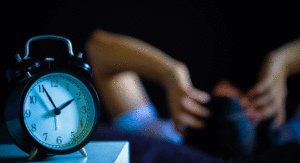 HYANNIS – If you have high blood pressure or type 2 diabetes, not getting enough sleep at night has more serious consequences than just feeling drowsy the next day. A new study published in the Journal of the American Heart Association shows that getting less than six hours of sleep a night can also cause an early death from heart disease, stroke or cancer.
HYANNIS – If you have high blood pressure or type 2 diabetes, not getting enough sleep at night has more serious consequences than just feeling drowsy the next day. A new study published in the Journal of the American Heart Association shows that getting less than six hours of sleep a night can also cause an early death from heart disease, stroke or cancer.
The study involved 1,741 men and women with a median age of 47 from the Penn State Adult Cohort. Participants were studied in a sleep lab for one night between 1991 and 1998. Researchers then tracked their cause of death through the end of 2016. Middle-aged people with high blood pressure and type 2 diabetes had twice the risk of dying from heart disease and stroke as those who slept more than six hours. Additionally, sleep-deprived people with a history of heart disease or stroke had three times the risk of dying from cancer during the study period.
If people slept longer than six hours, the risks disappeared. The study also showed that those who slept less but did not have high blood pressure or type 2 diabetes didn’t appear to have an increased risk of developing or dying from heart disease, stroke or cancer.
It is at least the fourth study to conclude the same risks.
Cardiologist Peter Chiotellis, MD, at the Heart Center on Cape Cod read this study and several of the others.
“The literature is somewhat vague in the reasoning why this is true, but they all link it back to the common theme that lack of sleep increases the inflammatory process,” he said. “We know that inflammation is linked to heart disease.”
Sleep is the period in which the body heals itself. Without adequate sleep, your body can’t repair itself properly.
“When you sleep, your parasympathetic nervous system kicks in, which is kind of like your peacefulness response,” Dr. Chiotellis said. “Your blood pressure and your heart rate drop at night when you are sleeping. We see that on heart monitors we put on patients. You can tell when they’re sleeping because their heart rate slows down. So, when people aren’t sleeping you have increased sympathetic activity. Elevated sympathetic activity leads to more stress on the body.”
One of the reasons lack of sleep causes damage is that it can cause endothelial dysfunction, which is impaired functioning of the vasculature of the blood vessels. When people get endothelial dysfunction, it is harder for the blood vessels to relax and constrict, which in and of itself can lead to high blood pressure and coronary heart disease, he said.
“I think there is also a mental stress component as well,” Dr. Chiotellis said. “When people are sleep deprived their anxiety is worse and their stress levels go up. That mental health easily transmits to physical health with regards to higher blood pressure, higher glucose so it leads to the risks of cardiovascular disease. We know that increased stress due to mental stress can cause heart disease as well.”
Unfortunately, the problem can create a vicious cycle for a lot of patients with chronic diseases. Existing health problems can cause stress and anxiety. Stress and anxiety can then cause problems with sleep, which in turn causes more serious health problems. The answer is to reduce stress and get more sleep.
How to Sleep Better
Dr, Chiotellis offered these tips for better sleep:
Melatonin can relax the mind and help you fall asleep easier. It also helps you fall back to sleep easier if you do wake up.
Don’t keep your cell phone or any electronic device in the bedroom while you sleep. The blue light affects serotonin levels in the brain and just having the phone next to you causes sleep disruption.
Reduce or eliminate caffeine, especially later in the day.
Exercise every day for at least a half an hour. The American Heart Association recommends at least 150 minutes of moderate exercise or 75 minutes of vigorous exercise a week.
Eat healthier and reduce alcohol consumption. People think that alcohol will help them fall asleep, but it actually causes disrupted sleep. Alcohol also increases anxiety and stress when consumed in large amounts.
The one thing you do not want to do is take over the counter medications like Benadryl or Tylenol PM, Dr. Chiotellis said. Ingredients in those medications cause memory loss in elderly patients with chronic use. They can also make you groggy in the morning.
Interestingly enough, the Penn State study showed that getting more than eight hours of sleep also has an elevated risk for health problems. The perfect “Goldilocks” amount is seven to eight hours of sleep every night.
























